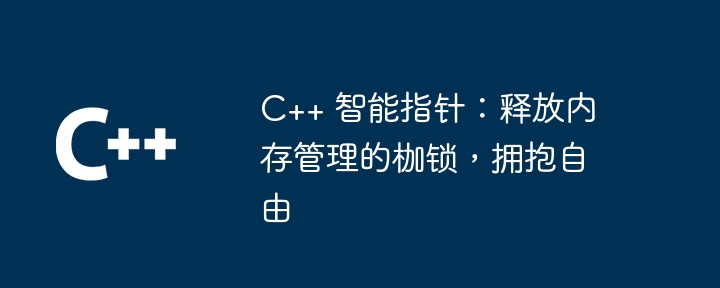Home >Backend Development >C++ >C++ smart pointers: Release the shackles of memory management and embrace freedom
C++ smart pointers: Release the shackles of memory management and embrace freedom
- 王林Original
- 2024-05-09 15:54:01659browse
Smart pointers provide lightweight classes in C that encapsulate native pointers and simplify memory management. Smart pointer types include auto_ptr (deprecated), unique_ptr (points to a single object, automatically released when it goes out of scope), and shared_ptr (allows multiple pointers to point to the same object, released when the reference count reaches zero). Smart pointers improve code robustness, security, and simplify memory management by automatically freeing memory and providing control over reference counting.

C Smart pointers: Release the shackles of memory management and embrace freedom
Introduction
Memory Management is a critical aspect of C programming that, if not handled properly, can easily lead to errors, memory leaks, and program crashes. C smart pointers are lightweight classes that encapsulate native pointers, providing us with the ability to use pointers without explicitly managing memory.
Smart pointer types
The C standard library provides three types of smart pointers:
- auto_ptr: the earliest smart pointer Pointer, now deprecated.
- unique_ptr: A pointer that can only point to a single object, which ensures that the memory is released immediately after the object goes out of scope.
- shared_ptr: Allow multiple pointers to point to the same object and keep track of their reference counts. The object is released when there are no more pointers pointing to it.
Practical case: unique_ptr
Let us understand how unique_ptr works through a simple example:
#include <memory>
int main() {
// 使用 unique_ptr 声明一个指向 int 的指针
std::unique_ptr<int> ptr(new int(10));
// 访问指针指向的值
std::cout << *ptr << std::endl;
// 当该作用域结束时,ptr 所指向的内存将被自动释放
return 0;
}In this example, unique_ptr is Memory is allocated immediately upon creation and automatically freed when its scope is exceeded. This means we don't have to write additional code to free memory.
Practical case: shared_ptr
shared_ptr allows multiple pointers to point to the same object and ensures that the object is released only after all pointers are released:
#include <memory>
int main() {
// 使用 shared_ptr 声明一个指向 int 的指针
std::shared_ptr<int> ptr1(new int(10));
// 创建另一个指向同一个 int 的共享指针
std::shared_ptr<int> ptr2 = ptr1;
// 两个指针指向同一块内存
std::cout << *ptr1 << std::endl;
std::cout << *ptr2 << std::endl;
// 当 ptr1 超出其作用域时,ptr2 仍然持有对该对象的引用,因此内存不会被释放
return 0;
}In this example , even if the first shared pointer goes out of its scope, the second shared pointer still holds a reference to the object, so the object is still in memory. The object is released when the last shared pointer is released.
Conclusion
C smart pointers help us write more robust and safer code by automating the memory management process. They eliminate the need to explicitly free memory and provide control over the reference count of pointed objects. By understanding the different types of smart pointers and how to use them, we can significantly simplify memory management and improve code quality.
The above is the detailed content of C++ smart pointers: Release the shackles of memory management and embrace freedom. For more information, please follow other related articles on the PHP Chinese website!

